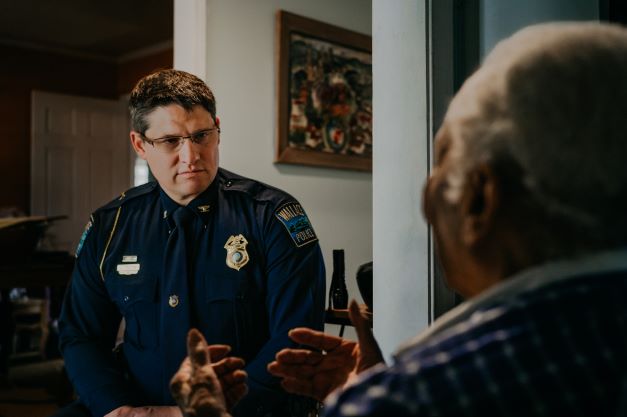Beyond the call of duty: Answering the need for care in rural communities

Crayton is personally invested in solving the gaps in health care for rural towns like Wallace. His son, Eli, was born prematurely at 24 weeks. Now 15, Eli, who lives with special needs and is non-verbal, has spent his entire life in and out of hospitals. More than100 days at a NICU in Greenville, five weeks at Presbyterian in Newark, New Jersey, and two months at Johns Hopkins. Though he sees the Wallace optometrist for eyeglasses, that is only medical service he gets in town. His feeding tube was administered in Wilmington, his ophthalmologist is at Duke and his GI doctor is in Chapel Hill. Crayton travels a minimum of 45 minutes to any of Eli’s doctor appointments.
“Anything beyond primary care, whether it’s dermatology, oncology, an MRI…anything short of an X-ray, you’re going somewhere else,” Crayton says.
Just as Crayton is adamant that Eli receives top-level care—no matter the distance—he is fully dedicated to preventive health care for his fellow officers. He created a wellness plan for his officers, which includes an annual physical by one of the town’s PCPs, a bi-annual physical fitness test with a bonus for those who receive a satisfactory assessment, and an annual mental health evaluation (studies show that law enforcement report much higher rates of mental health conditions compared to the general population).
According to Crayton, mental illness is the greatest health challenge in the community. The nearby inpatient mental health facility at ECU Health (formerly Vidant Duplin Hospital) closed permanently in August 2020. Since then, those who are involuntarily committed are sent to Butner in Granville County, a two-hour drive away. In fact, 94 of NC’s 100 counties qualify as mental health care shortage areas, and Duplin is one of them.
“Access to psychiatrists is a huge issue around here,” Smith says. “There’s also still the stigma around mental health. And so, I think it’s going to take a unique approach that’s tailored to this community to bust through that.”
This kind of localized, on-the-ground approach to community health is what Smith and others across Blue Cross NC are focused on building and growing through partnerships with leaders like Crayton. “Change only happens at the speed of trust and the ability to establish a relationship. And that takes time,” Smith says. It also takes being present in the communities you serve. It becomes personal. As Smith says, “It’s about giving back to the community that I was raised in. The reason I’m here [at Blue Cross NC] is because they are local, and they do care. That’s why I do what I do.”
Rural North Carolina faces a critical shortage of doctors, therapists and emergency medical services—and it shows in the declining health of the people who live there. They rely on their families, friends and community members to reach across the gap and offer support. Not every town has a Jimmy Crayton—but most have people who are similarly bound by a desire to care for their fellow neighbor. Unfortunately, that, on its own, isn’t enough.
Blue Cross NC is continuing to live and work in rural communities across the state, establishing relationships and building partnerships that help remove barriers and improve access to health care.
Because, in a small town, everybody helps everybody.







